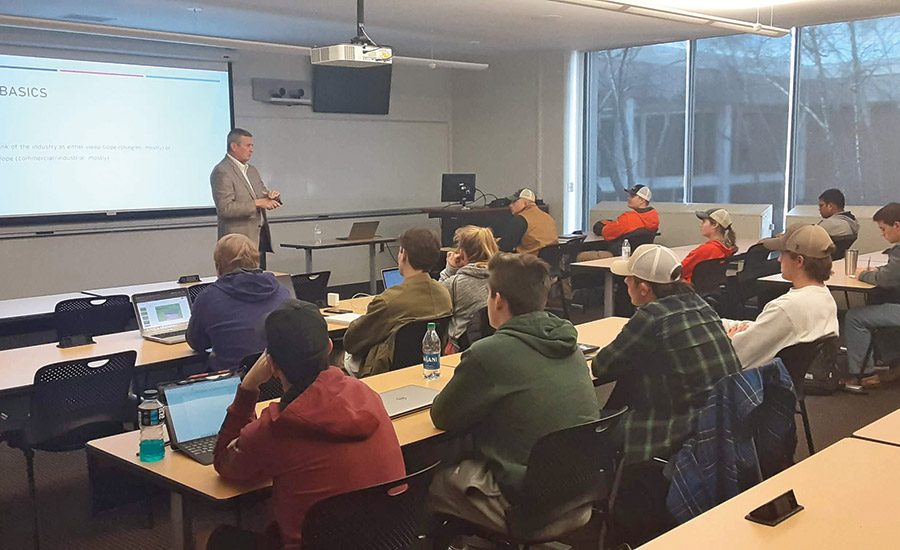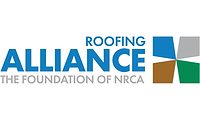Roofing 101: Roofing Alliance Sponsors College Course Focused on Roofing
Two-Phase Initiative Aims to Bring More Students into Industry with Nine-Credit Roofing Certificate Program

Guest lecturers from the roofing industry presented students with real-world knowledge during the semester. Photos courtesy of Dr. Dhaval Gajjar.

Twenty-one construction students signed up for the roofing course, blowing expectations out of the water and showing there is a demand for roofing-based curriculum at the university level.


Roofing contractors often lament that the industry’s labor shortage is caused by an emphasis on four-year college degree programs instead of the trades. But what if a university actually offered roofing as part of its curriculum?
Thanks to the Roofing Alliance, the foundation of the National Roofing Contractors Association (NRCA), that question has been answered. Students at Clemson University in South Carolina completed a three-credit college course entirely dedicated to roofing, and its success could lead to other schools teaching it.
A total of 21 construction science and management students signed up for the university’s roofing course in January, where they learned about everything from management and materials to career opportunities. Dr. Dhaval Gajjar, an assistant professor, designed and instructed the course with the assistance of industry professionals who also served as guest speakers.
He said as many contractors are aware, one of the key issues affecting the industry is the workforce, both on the crew and management sides. It’s compounded further by the fact that even when students study construction, roofing is hardly discussed.
“In the entire four-year curriculum, you probably talk about (roofing) for about 45-90 minutes,” Gajjar said, half-joking. “With roofing being such an important part of the building, I don’t think 45-90 minutes can do any justice to it.”
Gajjar isn’t an academic who merely took up construction as a different avenue of study. He earned his doctorate in construction management from Arizona State University in 2016, with both his master’s thesis and dissertation topics focusing on roofing. Following graduation, he worked in the industry for five years, including as a project manager for TEPCON Construction.
He became an assistant professor in July 2018 at Clemson as part of its construction science and management program. He said what drove him to the roofing industry was the simple fact that every building needs a roof.
“A roof is an important envelope for any building because when it’s working great, it’s great, but when it’s not working great, it’s not just a roofing system that needs replacement. It’s everything within or beneath it,” he said.
The course is just one of the items that has emerged from the Roofing Alliance’s Construction Management Schools Initiative Committee. Formed in 2013 along with multiple construction management universities, the long-term goal is to expose students and faculty to the roofing industry by enhancing their overall roofing knowledge.
Bennett Judson, the Alliance’s executive director, said the idea for the roofing college class started when the Alliance joined the American Council for Construction Education (ACEE) and encouraged faculty members to submit funding requests for studies benefiting the industry. After meeting with Alliance officials, Gajjar presented a funding request in April 2019 to develop and implement the college course.
“There is more awareness within our industry with people saying, ‘Hey, we’ve got to step up, we’ve got to find alternative resources,’ and we’re gaining more exposure with the general public,” Judson said. “We’re creating more of that awareness, and now the next step was looking at the curriculum.”
Phase 1 – Developing a Roofing Class
The program is being rolled out in two phases. The first phase was to develop the curriculum for a three-credit roofing class that counts toward graduation credits. This was no easy task, as roofing-specific curriculum isn’t commonplace. Since they were starting from scratch, the Alliance and Gajjar actively sought out input from the industry to develop the curriculum.
More than 80 Roofing Alliance members have committed to making the program a success through product donations, guest lecturing and content donations. About 20 of them volunteered to appear in person during the semester.
“It’s really an industry-academia effort,” Gajjar said.
Gajjar admitted he didn’t have high expectations for attendance, expecting five or so students to enroll. However, every time the class was posted it filled up, causing Gajjar to increase the class size and re-open it for enrollment. Ultimately, Gajjar had to cap it around 21 students.
“All the students came back with amazing reviews, saying how much they learned about the roofing industry, specifically they did not know that roofing could be such an in-depth field,” he said. “They were amazed to see all the leadership, the project management … they didn’t realize how much roofing is involved in the construction process.”
The COVID-19 pandemic did interrupt the course, specifically the opportunity for field trips or hands-on learning, but the rest of the course carried on through virtual learning, whether it was through live videos or pre-recorded lectures.
With the first course completed, an exit survey was conducted to determine what ways the class succeeded and how it can be tweaked and improved. The official results haven’t been published as of the writing of this article, but Judson said the initial feedback has been positive. In fact, some of the students gained internships with roofing companies after taking the course.
“They’ve been very eager to learn and there has been really good interaction and dialogue between the students and the industry lecturers,” said Judson.
Phase 2 – Next Step
With the first phase on track, the Roofing Alliance and Gajjar are looking to the future. Phase two consists of creating two additional roofing-specific classes that focus on the topics not covered in the first class.
The goal is to have a university level nine-credit, three-course roofing program by the summer of 2022. In addition to earning nine credits, students who complete the course will receive a certificate demonstrating their knowledge and skills.
“When the students graduate from this four-year degree program, they have a construction management bachelor’s, but at the same time they have an official certificate in roofing as well when they go into the industry,” Gajjar said.
Should the Alliance succeed in implementing this program, they don’t intend on keeping it solely at Clemson. The ultimate goal is to have industry professionals partner with construction management and technical universities around the nation to implement the nine-credit program in their curriculum. For example, the initial course taught in January is ready for distribution.
“The key in this is to go out and market to other universities,” Gajjar said. “It’s going to be a huge challenge, but it’s definitely doable.”
Judson said once the course materials are ready to be shared, Alliance members can use them as an outreach tool to establish relationships with local construction management schools and colleges. In doing so, they can become guest speakers that can share their expertise and the career options available to students.
“We don’t have a specific marketing plan in place just yet, but we have regular communication with the 80-plus schools that are members of the ACCE,” Judson said. “We plan to reach out through our media partners, social media posts and our members just as soon as we have details to share.”
Gajjar said the whole certificate program is going to be offered in an online format. There will be an in-person option, but there will also be an option to go fully online, meaning the course will be available despite restrictions caused by the pandemic.
Students aren’t the only ones who benefit from the course. Contractors currently working in the industry are encouraged to sign up for the course when it’s available. Gajjar said in doing so, roofers can gain a holistic view of the entire industry to improve their business. However, Gajjar said there are other reasons industry professionals may want to become involved.
“The benefit for the roofing contractors, manufacturers and distributors is that student group population that you have access to, locally, that you’ve pretty much honed,” Gajjar said. “If you have 20 students in one university and only eight of them want to come work in roofing, you have them right there, they are yours.”
The college course pairs well with the NRCA’s ProCertification program, which was designed to provide experienced professionals national certifications that demonstrates their skills and abilities in specific roof system installations.
“Everyone is looking for solutions and to think outside of the box and come up with ways we can entice people into the industry,” Judson said.
Gajjar and Judson encourage roofing professionals interested in the college course to contact them at dgajjar@clemson.edu and bjudson@nrca.net.
Looking for a reprint of this article?
From high-res PDFs to custom plaques, order your copy today!





.jpg?height=200&t=1724950853&width=200)


